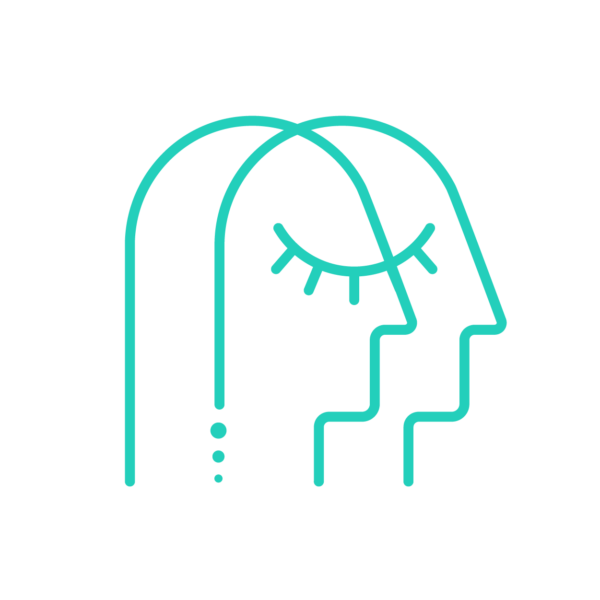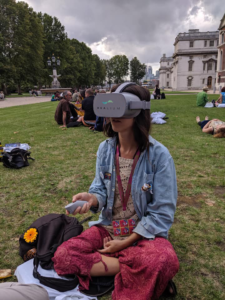




Prioritize student mental health as well as support well-being and skill-building with mental health days and Healium experiences.

The concept of mental health days off from school has gained traction as of late, with proposals for essential breaks for students in order to address and manage their mental health needs.
One cause for this momentum was the COVID-19 pandemic, which amplified existing academic and social pressures. This crisis, marked by increased reports of anxiety, depression, and emergency visits for mental health concerns, directly impacted students’ academic performance and overall well-being.
Given the clear link between mental well-being and learning, mental health days are not just beneficial but necessary for students’ success and health. This approach is a critical step in supporting students, recognizing the vital role of mental health in education.
Prior to the pandemic, mental health challenges were already a concern; however, the onset of COVID-19 has led to an alarming increase in such cases. Specifically, the Centers for Disease Control and Prevention (CDC) found a 24% rise in emergency department visits for mental health concerns among children aged 5–11 and a 31% increase among those aged 12–17 when compared to the previous year.
These statistics underscore a deepening crisis that demands immediate attention.
This compounded with the pressures of academic expectations and social dynamics, has created a perfect storm for mental health issues among students. The loss of normalcy and the ongoing uncertainty have not only affected students’ mental health but have also posed significant barriers to their ability to learn and engage fully in their educational journey.
As such, the growing mental health crisis among students is not just a health issue but an educational one, calling for comprehensive strategies to support students’ mental and emotional well-being.
• Reducing Stigma: Allowing mental health days fosters a culture where discussing mental health openly is encouraged. This openness benefits students, parents, and educators alike, making mental well-being a shared priority.
• Prioritizing Mental Health: By equating mental health with physical health, schools send a clear message: mental well-being is crucial for student success. This recognition supports students’ overall health and encourages them to take necessary steps for their mental wellness.
• Boosting Academic Performance: Stress negatively impacts learning. The Mayo Clinic agrees that mental health days can reduce stress, leading to better academic outcomes. Students return to school more focused and ready to learn, improving retention and understanding.
• Early Intervention: Mental health days act as a safety net, offering early signs when a student might be struggling. This early detection can lead to timely support, preventing more significant issues and promoting long-term well-being.
By providing mental health days, schools can create a supportive environment that not only enhances academic success but also prioritizes the mental and emotional health of their students.
States across the U.S. are increasingly recognizing the mental health crisis among students through legislation. Arizona, California, Colorado, Connecticut, Illinois, Maine, Nevada, Oregon, Virginia, Washington, and Kentucky have already passed bills allowing students to take mental health days. This legislation varies by state but commonly treats mental health absences as valid and excused, much like sick days.
These laws underscore the growing understanding that mental well-being is as crucial as physical health for academic success. They aim to destigmatize mental health issues, provide students with necessary breaks for self-care, and acknowledge that optimal learning requires mental and emotional wellness.
Implementing mental health days effectively requires clear guidelines and equitable access for all students. Schools should outline when and how these days can be used, ensuring students understand this provision as part of their broader support system. Educators and parents play crucial roles, guiding students on how to use these days for genuine mental health recovery. This collaborative approach ensures mental health days fulfill their purpose: supporting students’ well-being and academic success.
Recognizing when to take a mental health day is crucial, but often harder than it sounds. It requires a level of honesty with yourself that many struggle with. If your state allows for mental health days, keep an eye out for the following key indicators:
• Overwhelming stress or anxiety that impedes daily activities.
• Persistent feelings of sadness, fatigue, or disinterest in usual activities.
• Physical symptoms of stress, such as headaches or stomach aches.
• A recent surge of emotional events, such as conflicts or losses
 Maximizing the Benefit of Mental Health Days
Maximizing the Benefit of Mental Health DaysMental health days should not be spent catching up on homework or studying. The goal is to take a step back from academic pressures, allowing you or the student to return refreshed and with a clearer mind.
To ensure a mental health day effectively aids in a student’s recovery and well-being, consider the following activities:
• Engage in Relaxation Techniques: Practices like meditation, yoga, or deep-breathing exercises can help alleviate stress.
• Spend Time in Nature: A change of scenery, especially in natural settings, can boost mood and reduce anxiety.
• Pursue a Hobby: Encourage students to engage in activities they enjoy but often don’t have time for, such as reading, drawing, or playing an instrument.
• Stay Physically Active: Physical activity is a proven mood enhancer. Even a short walk can significantly impact mental well-being.
• Reflect and Plan: Use the time to reflect on stressors and plan coping strategies for when they return to school.
Prioritizing student mental health doesn’t have to be all or nothing. If offering mental health days is not an option, mental health breaks are. Healium helps students get much needed breaks by helping them escape and recharge, as well as coaching them through the much needed skills they need in learning to self-regulate their emotions.
To learn more about how schools are integrating Healium, watch the video below!
• Immediate Stress Relief: Healium offers quick, immersive escapes that can significantly lower stress levels in just a few minutes, making it a perfect activity for mental health days.
• Skill Building: By using biofeedback, students learn how to control their stress and anxiety, equipping them with valuable skills they can use in and out of the classroom.
• Accessibility: Healium’s VR experiences are designed to be easily accessible, requiring minimal setup and offering a variety of experiences suitable for everyone.
• Evidence-Based: Supported by research, Healium’s effectiveness in reducing anxiety and improving mood is a testament to its potential impact on students’ well-being.
Mental health days are a significant step forward in acknowledging the importance of mental well-being in educational success. By pairing these days with resources like Healium, schools can offer a more comprehensive support system that not only provides a break from stress but also teaches students how to manage their mental health proactively.
Provide your students with the tools to understand, manage, and improve their mental health with Healium. Together, we can create a supportive, resilient, and empowered generation ready to face the challenges of tomorrow.
Explore how Healium can transform mental health days from simple breaks to opportunities for growth and learning.
Our team is here to show you how it works and answer any question you have. Contact us today!
Sarah Hill, a former interactive TV news journalist at NBC, ABC, and CBS affiliates in Missouri, gained recognition for pioneering interactive news broadcasting using Google Hangouts. She is now the CEO of Healium, the world’s first biometrically powered VR/AR channel, helping those with stress, anxiety, insomnia, and other struggles through biofeedback storytelling. With patents, clinical validation, and over seven million views, she has reshaped the landscape of immersive media.